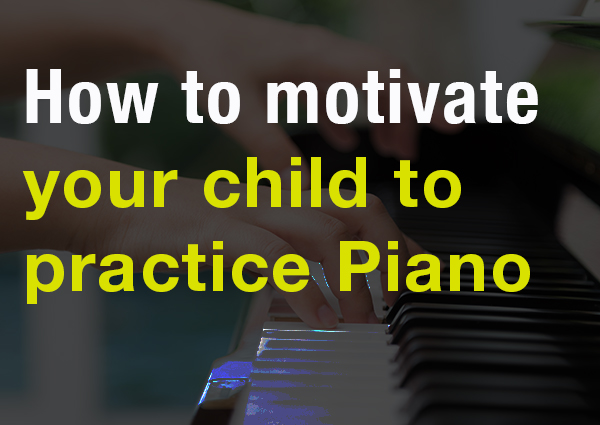How To Motivate Your Child To Practice Piano
In the following, we will be discussing an important topic that is “How to motivate your child to practice Piano” and will discuss it in detail within the article may parents struggle to encourage children of the “smartphone generation” to take a seat at the piano and practice. A piano, after all, does not have bright colors, glowing buttons, or cool features.
For most children, all it has to offer are some sheets of music and also the instrument itself. Chances are that your kid simply cannot fathom that playing the piano can be fun, let alone feel impressed to practice efficiently! Unfortunately, there’s no foolproof formula that’ll get youngsters excited regarding practicing piano. But there are a number of strategies you can try out that will make a difference.
1. The Chemistry Needs To Be Right
Finding the right piano teacher is crucial. Your son or daughter should be able to connect with their teacher. No matter how accomplished or qualified a teacher is, they won’t be able to teach your child successfully if the two don’t get along with each other. Listen carefully when your kid talks regarding their teacher and pay attention to signs that they do not gel well.
Trial lessons are often helpful, however, can only give a primary impression. If the trial goes well you should keep monitoring your child’s attitude in the following lessons. Asking your child if they click with their teacher or not in these early phases can prevent lots of disheartening practice sessions later down the track!
Of course, it’s natural for your kid to complain concerning having to learn something new or difficult. This is something you both ought to go through, after all! Small frustrations can inevitably arise once in a while, but learning to cope with these is just another valuable part of the learning experience.
However, if your kid starts to complain regarding the teacher as an individual, do your best to work out why. Try talking to the teacher about it: There might be ways to solve this issue together. If it does not look possible, don’t hesitate to switch teachers. Let’s face it: neither your kid nor the teacher can enjoy or benefit from the time spent on lessons if they do not connect. A child that dislikes their teacher can almost certainly find it tough to stay motivated.
Teachers do tend to offer more of themselves in lessons if the kid seems to be progressing and enthusiastic. But this merely won’t happen if the chemistry is not right! Once you have found the right teacher, practicing at home is the next step to master the piano. In the early stages, it is vital to keep practice sessions quite short.
Children are going to be much happier to work through 2 sessions of ten to fifteen minutes of practice daily, instead of one long session in the evening. It additionally helps to make practice a part of their routine throughout the week. Saving practice for the weekend will not help much, as your child will lose the opportunity to reinforce new skills each day. The daily repetition of hand movements, patterns and exercises is an important part of practice for even the most accomplished pianists!
You’ll probably witness yourself how long gaps between practice sessions can cause your child’s skills to fade, slowing their progress as a result. Avoid this by encouraging them to practice a little bit every day. Point out that their only other choice is doing one long, difficult hour on a Saturday afternoon and they’ll definitely be on board with keeping a daily routine! As a parent, it’s really difficult for you not to beam with pride when your child learns a new thing. Children love to hear that you’re proud of them too! But you’ve got to be careful that they don’t start feeling the pressure to perform and meet your expectations.
At the start, most pieces your child learns won’t sound that nice as they practice them. But that’s totally fine! After all, you cannot expect them to pick up pieces by Chopin and Beethoven after a couple of weeks of lessons. Learning piano is a process that requires time. Try to be patient as well as help your child to stay patient too. Give your kid the liberty and freedom to learn at their own pace, and encourage them when they achieve new milestones, even if they’re just taking baby steps! Every kid learns differently and learns to love different aspects of piano-playing. This is something we should celebrate.
2. Use Small Treats
Developing a routine of practicing takes time however is also vital. To get into the habit of practicing regularly, little treats can be helpful in the beginning. These treats can be almost anything, depending on what works for your child. I recommend negotiating together with your son or daughter about the sort of treats they’d like and what you approve of, like extra minutes to spend at the PC, extra mobile phone credits, or staying up a bit longer on the weekend once your kid practices often.
A very popular way of motivating and reaching goals is collecting “points.” These points can be almost anything, but stickers are the easiest way to track them. There are stickers in all types of shapes and colors, thus have your kid select some he/she likes. And whenever your kid practices, he/she gets to place a sticker either on a special chart you set up for this purpose, or maybe just a calendar or a little booklet.
It’s really important that you and your child decide on a specific treat for a certain amount of stickers. That saves you some discussion afterward. Collecting points (or stickers) provides further motivation and is an objective your kid will reach faster than mastering an entire piano piece. This works especially well for younger students. The younger your child is, the more important it is to have small goals they can reach in a relatively short amount of time.
3. How You Can Make Practice Cool And Fun
Kids and teens love smartphones and tablet PCs, or in short, everything that has a screen and which looks like fun. This enthusiasm for technical devices is often useful once it comes to teaching piano, too. Some piano lecturers already include tablet PCs in their lessons. This lends a certain “coolness factor” that has a positive impact on a child’s attitude towards practicing. There are also many different apps for ear coaching or reading notes.
The fascination with apps and PCs can also be used to make practicing more fun and to provide additional incentives for practicing. That’s why many piano lecturers are already including flow key in their teaching methods. Inflow key, the student/kid is in an interactive learning environment that has all of the appeals of a cool as well as the fun app. They can scroll and browse through our library, clicking and swiping to search out a song he/she really desires to play.
Then, your kid will learn it in an interactive approach, getting immediate feedback. Interacting with electronic devices is something children and teenagers grow up with and enjoy. The fun they experience doing this will additionally become part of practicing once they use the flow key. This way, the frustration usually experienced when practicing may be turned into learning with joy. For this dance classes in rohini are doing their work so well.
4. Find Your Set Of Little Helpers
When you begin to learn how to play an instrument, motivation usually is at its highest. Everything is new and exciting. Particularly at the piano, it is quite possible to play a nice little tune quickly. The challenge is to truly keep this motivation over a long amount of time. When making progress, the pieces become tougher, and you need to work more for your progress. Many people struggle with that and stop playing. There isn’t one single magic trick to overcome this challenge and not give up. As with most things in life, it’s a combination of several factors that lead to success.

